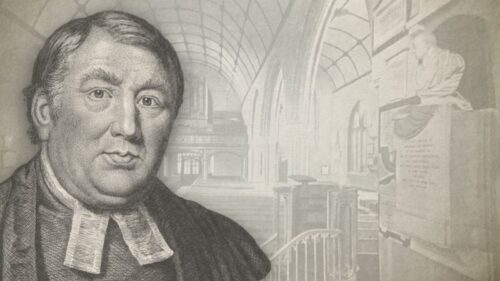
March 31—Morning Devotion
“Having a desire to depart, and to be with Christ.”—Philippians 1:23
My soul, thou hast not, I hope, dismissed the solemn thoughts opened to thy view by the scripture af yesterday. Surely, since that last morning, thou hast had but too many renewed occasions to feel the truth of it. Sin is not only present with thee at all times, but in thee, and as inseparable from thy unrenewed part, as the shadow from the substance. Thou knowest this, thou feelest it, thou groanest under it; and the consciousness of it is, in itself, enough to make thee go humbly all thy days. All other afflictions are nothing to this affliction: this, like the ocean compared to rivers, surpasseth and swalloweth up all. It is indeed a soul-supporting thought, (and, blessed be God, thou feelest the sweetness of it,) that under all, and in all, Jesus is thy hope. And while sin is always present with thee, Jesus, thy Advocate and Propitiation, is present for thee with the Father. But though in Him, and his righteousness accepted and secure, yet the consideration how much thy daily short-comings and transgressions dishonour God, and deprive thee of comfort here, is matter sufficient to make thine eyes run down with water, and thine heart continually to mourn before the-mercy-seat. And will these things always be the same, whilst thou carriest about with thee this body of sin? Shall this perishing part of thine be always so unfavourable to the sweet and gracious desires of the soul? Shall I never, never truly and uninterruptedly enjoy Jesus until the body is dissolved, and the dust returns to the earth out of which that part of my nature was taken? Pause, my soul, and say – Hast thou not then a desire to depart, and to be with Christ! Is not the grave, in this view, not only made bearable, but even desirable-nay, even pleasant? What, shall I never be wholly free from sin, until that I am wholy freed from the body! Shall I never be secure of sweet enjoyment with Jesus in ordinances, in retirement, in prayer, in praise, until that I drop this body of sin? And wouldest thou not, my soul, gladly part with such a partner, near and dear as it is, if this partner, in its present state, so dreadfully robs thee of thy most precious enjoyments? It is true, death in itself is not desirable: but if only by dying thou canst enjoy Jesus; and if only by dying this body will lose its corruptions; if the grave hath a commission from thy Jesus to destroy that part only of thy body which is corrupt, and at the same time to act as a preserver of that part which Jesus at the last day will raise up to glory; if Jesus hath assured thee that, though worms destroy thy corrupt part, yet thine eyes, even thy bodily eyes, when raised up by Jesus a glorifled body, shall see God; and if thy body, thus raised up and re-animated, shall then be not only wholly freed from all corruption, but equally disposed as the soul to praise thy God and Saviour for ever and for ever, and both soul and body unite as dear friends in this blessed service. Oh then, from henceforth never, my soul, look at death any more but as thy kind friend. It is to die to sin; but it is to live to Jesus. It is to be dead to all things but Jesus, that Jesus may be all things in life for ever. Oh then, for this desire to depart and to be with Christ!
Robert Hawker (1753-1827) was an Anglican (High-Calvinist) preacher who served as Vicar of Charles Church, Plymouth. John Hazelton wrote of him:
“The prominent features…in Robert Hawker's testimony…was the Person of Christ….Dr. Hawker delighted to speak of his Lord as "My most glorious Christ.” What anxious heart but finds at times in the perusal of the doctor's writings a measure of relief, a softening, and a mellowing? an almost imperceptible yet secret and constraining power in leading out of self and off from the misery and bondage of the flesh into a contemplation of the Person and preciousness of Christ as "the chiefest among ten thousand and the altogether lovely." Christ and Him crucified was emphatically the burden of his song and the keynote of his ministry. He preached his last sermon in Charles Church on March 18th, 1827, and on April 6th he died, after being six years curate and forty-three years vicar of the parish. On the last day of his life he repeated a part of Ephesians 1, from the 6th to the 12th verses, and as he proceeded he enlarged on the verses, but dwelt more fully on these words: "To the praise of His glory Who first trusted in Christ." He paused and asked, "Who first trusted in Christ?" And then made this answer: "It was God the Father Who first trusted in Christ."
Robert Hawker on the Biblical Covenants (Complete)
Robert Hawker's Poor Man's Morning Portions





